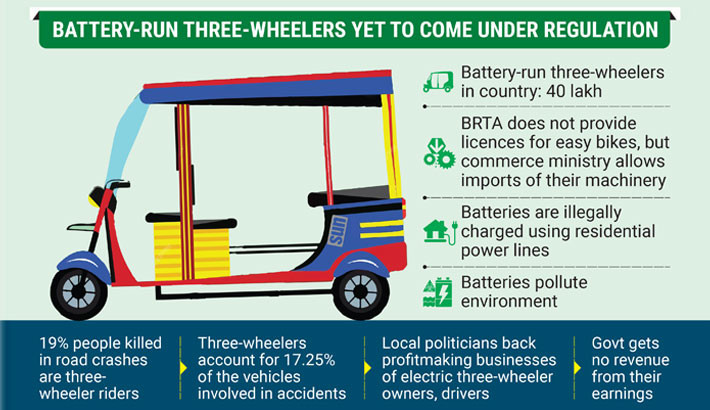Move to legalise battery-run three-wheelers stalls
Guidelines yet to see light
Published: 15 May 2024

The government’s move to legalise and regulate battery-powered three-wheelers has been stuck in a bureaucratic quagmire with the guidelines yet to see light.
Battery-run auto-rickshaws, easy bikes, Nasimon and Karimon are not legal and their fragile structure often results in huge casualties following accidents, but still, they ply the country’s roads allegedly by bribing law enforcers. Their huge demand as well as a syndicate of politicians, vehicle owners, drivers and administrative officers also plays a role in their movement.
As the government is unable to ban these vehicles – which make huge profits by illegally consuming power without giving any tax – it is making guidelines to legalise such vehicles.
However, the comprehensive policy is stuck at the Road Transport and Highways Division and has not seen the light of day yet.
Asked when the comprehensive three-wheeler policy will be unveiled, ABM Amin Ullah Nuri, secretary of the Road Transport and Highways Division, told the Daily Sun, “The three-wheeler guideline is in the final stage. It will soon be sent from the ministry to the Cabinet. If everyone agrees to the draft, then the guideline will be implemented quickly.”
Asked about the scope of the new guideline, Nuri said many issues will be included in the guideline, and he can make comments only after it is passed.
The three-wheeler guideline that is currently in effect was formulated in 2007, but it only applies to the CNG-powered auto-rickshaws. There is no guideline for battery-powered vehicles, so the government is thinking about making a single guideline for all types of three-wheelers with an aim to regulate their movement, said sector insiders.
Sources at the Bangladesh Road Transport Authority (BRTA) said it only provides licences to CNG-powered auto-rickshaws. No licence is issued for other three-wheelers that run on batteries. So, they are illegal vehicles.
People involved in the sector said the batteries used in the three-wheelers are harmful to the environment. Their brake system is not very good. The size of a three-wheeler is inordinately big.
The guidelines for three-wheelers will address these issues. It will cap the lifespan of these vehicles, and fix the number of seats in them and their design.
BRTA officials said the guideline will also specify the areas and routes where electric three-wheelers can operate.
Drivers of battery-operated three-wheelers said they drive them only to earn a livelihood. Sometimes they have to face lawsuits, but still, they operate it for a living. Getting a guideline and legal framework will definitely improve their condition.
Md Hadiuzzaman, a transport expert and professor at Bangladesh University of Engineering and Technology (BUET), told the Daily Sun, “A three-wheeler policy is essential because it is a legal document.
Although three-wheelers are illegal, they are running commercially. This is causing the government to lose revenue while generating a glut of illegal earnings. Local influential politicians and administrative officials have formed a syndicate centred on the business.
“It can be legalised, but there should be clear guidelines on which roads it can run. A three-wheeler’s features should be specified.”
Regarding the delay in formulating the guideline, he said, “The commerce ministry gives permission to import three-wheeler machinery, but it does not consider where such vehicles would run. One ministry wants to dump its waste on another ministry.
“BRTA will have to register 40-50 lakh three-wheelers as motor vehicles, but it does not have that capability. So if there is a mistake in the plan, there will be significant repercussions.”
19% killed in crashes are 3-wheeler passengers
According to the Road Safety Foundation’s information, 6,911 road accidents occurred across the country in 2023, in which 6,524 people were killed and 11,407 were injured.
Among those killed in crashes, 1,299 were three-wheeler passengers, which is about 18.53% of the total deaths. Three-wheelers accounted for 17.25% of the vehicles involved in accidents.
Saidur Rahman, chief executive of Road Safety Foundation, told the Daily Sun, “Three-wheelers are risky vehicles, so we should consider an alternative to them. The design of highways should be changed before banning three-wheeler movement on highways. The district roads, upazila roads and rural roads are connected to the highways, so three-wheelers are forced to use the highways.
“Moreover, not all highways have road dividers. Three-wheelers have no other options for crossing short distances, so people are using these vehicles under compulsion. Three-wheelers are one of the major causes of accidents.”
40 lakh battery-operated illegal 3-wheelers in country
During a question and answer session of the parliament in February this year, it was reported that there are over 40 lakh electric three-wheelers in Bangladesh. These vehicles use lead batteries, which take around eight hours to charge. A lithium battery of the same capacity will take only half an hour to charge.
Sources at electricity distribution companies said at least 500 megawatts of electricity is being used daily to charge the easy bikes across the country. These easy bikes are charged from commercial or residential lines. In some cases electricity is stolen for this purpose, causing the government to lose a huge amount of revenue.
Earlier, the Supreme Court ordered authorities concerned to stop the operation of battery¬-run easy bikes on the country’s highways.
According to the court order, easy bikes cannot run on the highways as per the government’s draft policy on the import, manufacture and movement of vehicles. However, easy bikes can run on internal roads.
Khalequzzaman Lipon, convener of Rickshaw, Battery Rickshaw-Van and Easy-bike Driver Sangram Parishad, said, “About 50 lakh people across the country are directly involved in operating battery-powered vehicles, including easy bikes. Two and a half to three crore people are indirectly related to them. So, it will not be right to ban these vehicles.
“Therefore, a proper management and control policy for battery-powered and similar motor vehicles should be finalised. These should be brought under the registration,” he said.

